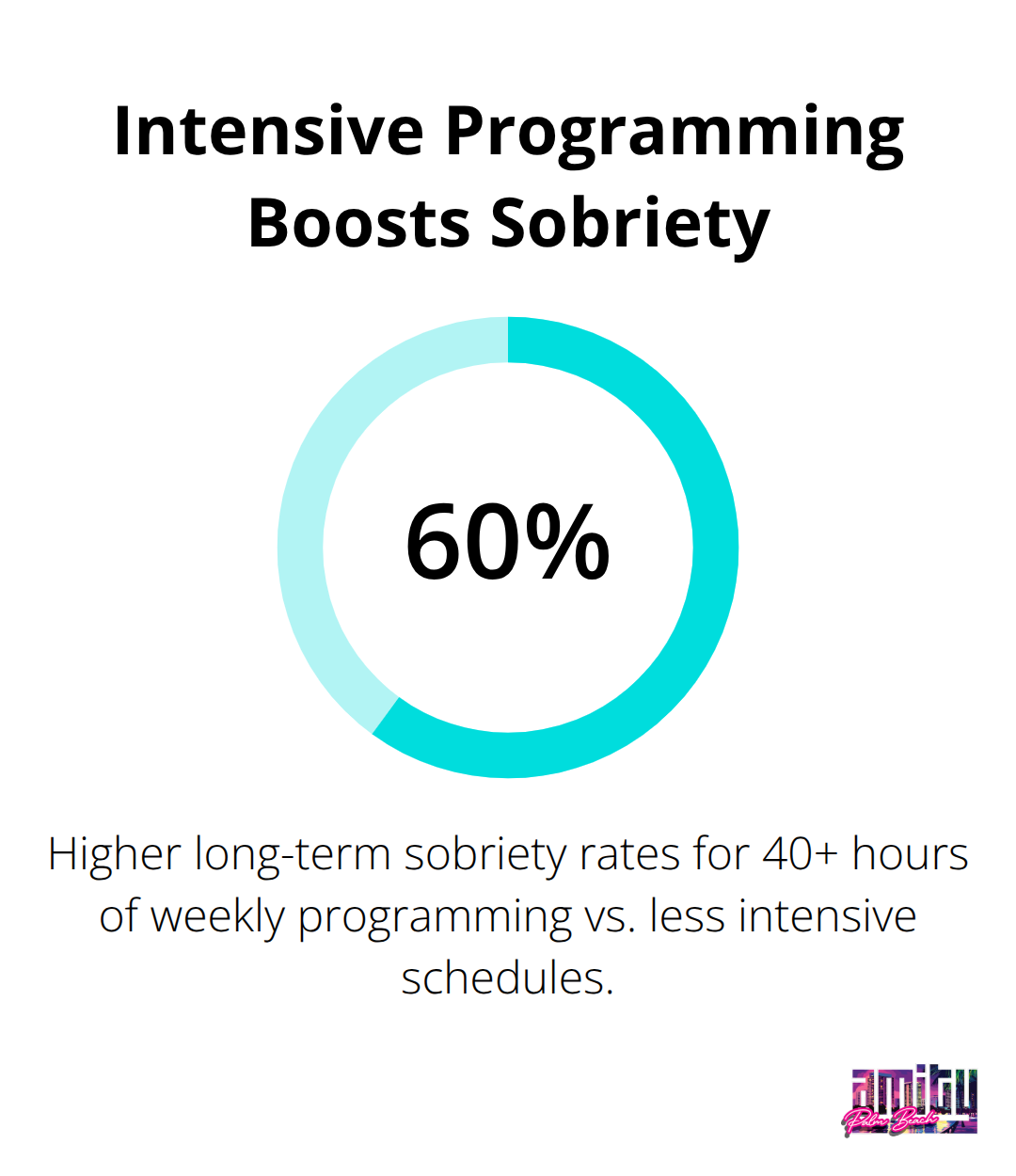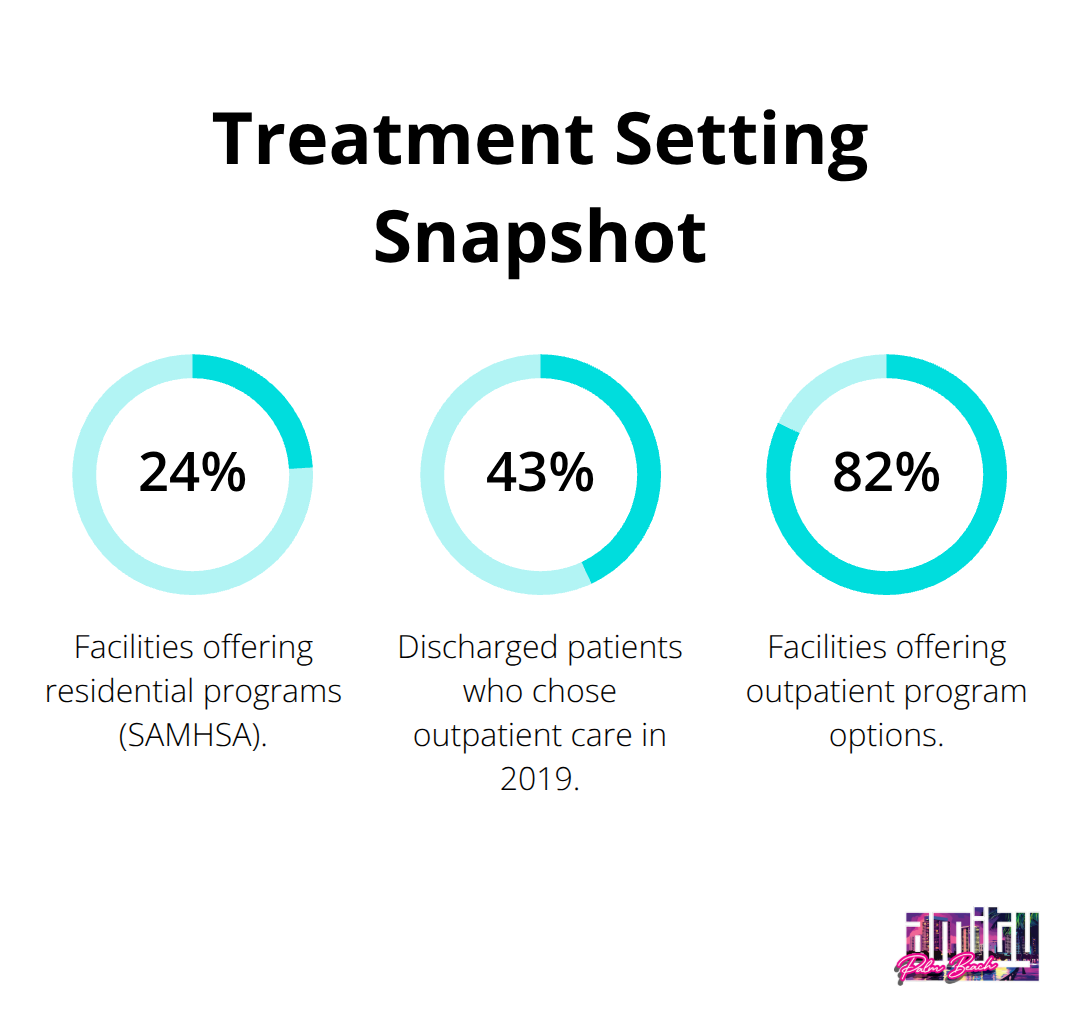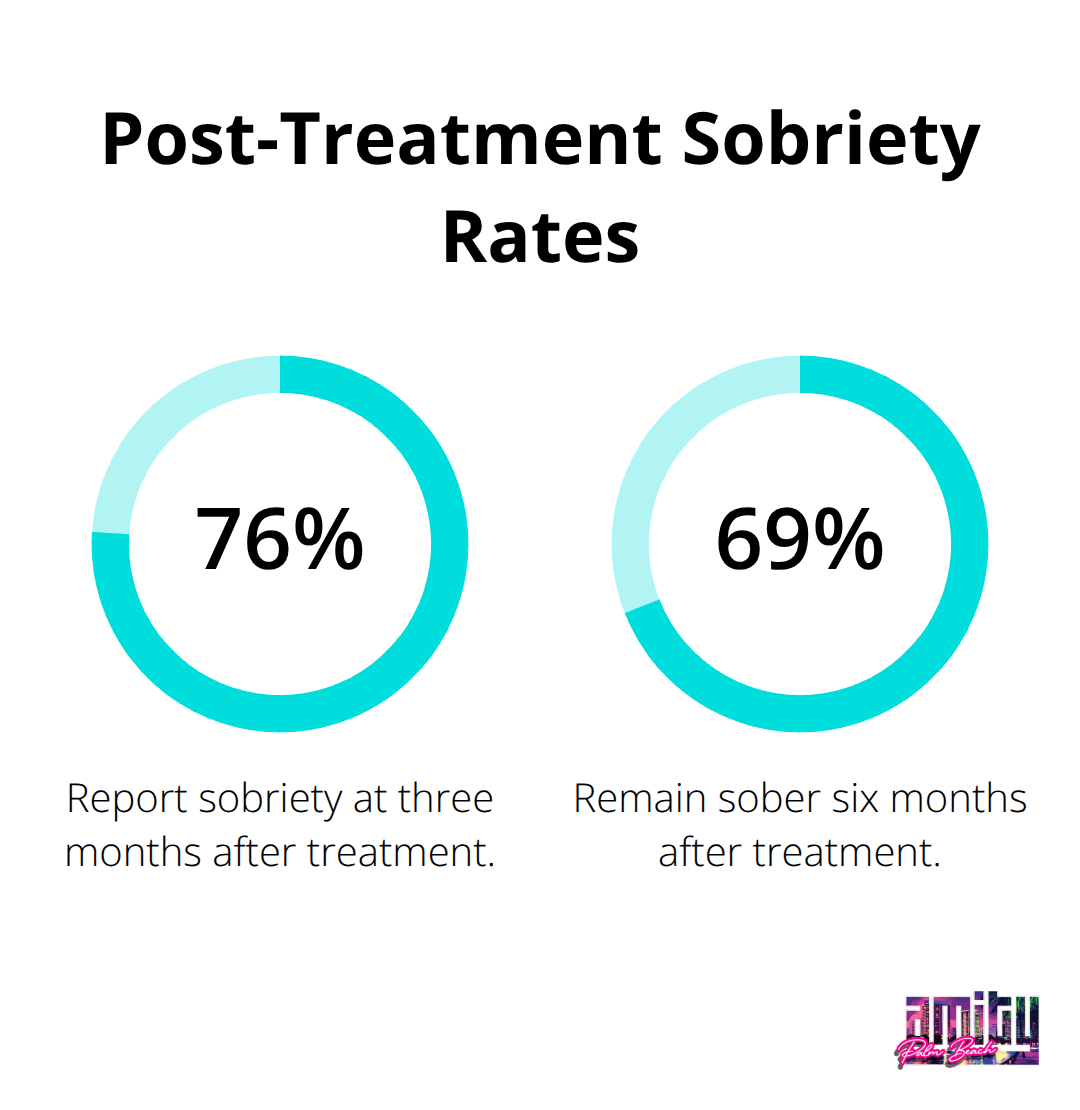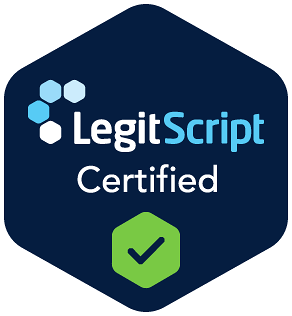Drug addiction affects millions of Americans, with over 21 million people needing substance abuse treatment according to SAMHSA data. Many wonder how does rehab work for drug addicts and what the recovery process involves.
We at Amity Palm Beach understand that choosing treatment represents a major decision. Professional rehabilitation programs use evidence-based methods to address both physical dependence and underlying psychological factors that drive addiction.
What Happens During Your First Days in Rehab
Assessment Creates Your Recovery Foundation
The moment you enter treatment, clinical teams conduct comprehensive medical and psychological assessments within the first 24 hours. This evaluation examines your substance use history, mental health status, medical conditions, and social circumstances to create your personalized treatment plan. The assessment process includes blood work, psychological tests, and detailed interviews with licensed clinicians who identify co-occurring disorders (which affect over 50% of individuals who enter treatment).

Medical Detox Prevents Life-Threatening Complications
Medical detoxification represents the most dangerous phase of recovery, particularly for alcohol and benzodiazepine withdrawal which can cause life-threatening seizures. Treatment centers provide 24/7 medical supervision during the 7-10 day detox period, using FDA-approved medications to manage withdrawal symptoms safely. Medically supervised detox significantly reduces complications compared to unsupervised withdrawal attempts. Physicians monitor vital signs every four hours and adjust medications based on withdrawal severity scales.
Structured Programming Replaces Destructive Patterns
Treatment days begin at 7 AM with medical check-ins, followed by individual therapy sessions, group counseling, and experiential therapies like yoga or art therapy. Each client attends 6-8 hours of structured programming daily, including cognitive behavioral therapy sessions, family therapy calls, and medication management appointments. Research from the American Journal of Psychiatry shows that clients who participate in 40+ hours of weekly programming achieve 60% higher long-term sobriety rates than those in less intensive programs.
These initial days establish the foundation for your recovery journey, but the real transformation happens through the specific types of treatment programs available to address your unique needs.
Which Treatment Program Fits Your Recovery Needs
Residential Programs Provide Maximum Structure
Inpatient residential treatment offers the highest level of care, with clients who live on-site for 30-90 days while they receive intensive therapy and medical supervision. SAMHSA data shows that 24% of treatment facilities offer residential programs, with most facilities that provide long-term options that exceed 30 days. These programs work best for individuals with severe addictions, multiple failed treatment attempts, or unsafe home environments.

Daily schedules include 6-8 hours of individual therapy, group sessions, and medical checks, which create a controlled environment that removes all substance access and triggers. Florida reports the highest residential completion rates at 70% (demonstrating the effectiveness of immersive treatment approaches).
Outpatient Programs Balance Treatment with Daily Life
Intensive outpatient programs require clients to attend 3-5 days per week of treatment while they maintain work, school, or family responsibilities. SAMHSA reports that 43% of discharged patients chose outpatient care in 2019, with 82% of facilities that offer these flexible options. Standard outpatient involves 1-3 sessions weekly, while intensive programs provide 9-20 hours of weekly therapy. These programs suit individuals with stable homes, strong support systems, and less severe addictions. The key advantage lies in the practice of recovery skills in real-world situations while clients maintain essential life responsibilities.
Dual Diagnosis Treatment Addresses Mental Health Simultaneously
More than 50% of individuals who enter treatment have co-occurring mental health disorders that require specialized integrated care. Dual diagnosis programs treat addiction and conditions like depression, anxiety, or PTSD simultaneously through coordinated treatment teams. Standard addiction-only programs often fail because untreated mental health issues trigger relapse when clinicians leave them unaddressed. These specialized programs use psychiatric medications, trauma therapy, and addiction counseling that cross-trained clinicians deliver (who understand how mental health symptoms interact with substance use patterns).
The success of any program depends heavily on the specific treatment methods and therapeutic approaches that clinicians use throughout your recovery journey.
What Treatment Methods Actually Work in Rehab
Individual Therapy Targets Your Specific Addiction Patterns
Licensed clinicians conduct one-on-one sessions 3-5 times weekly with cognitive behavioral therapy, which helps you identify and change thought patterns that trigger substance use. The National Institute on Drug Abuse reports that CBT reduces relapse rates by 60% when combined with other treatments. Dialectical behavior therapy teaches emotion regulation skills through weekly individual sessions that last 50-90 minutes. Motivational interview sessions help you explore your personal reasons for change while therapists guide you through stages of readiness. These individual sessions create safe spaces to address trauma, family issues, and personal triggers that group settings cannot accommodate.
Medication-Assisted Treatment Reduces Cravings and Withdrawal
FDA-approved medications like naltrexone, buprenorphine, and methadone significantly improve treatment outcomes when integrated into comprehensive programs. In 2023, approximately 59% of facilities now offer medication-assisted treatment, which reflects its proven effectiveness. Naltrexone blocks opioid receptors and reduces alcohol cravings, while buprenorphine prevents withdrawal symptoms without euphoria production. These medications work best when combined with counseling and behavioral therapies. Treatment centers that embrace MAT without stigma achieve higher retention rates because clients experience fewer physical symptoms that drive early dropout.
Group Therapy Sessions Build Communication Skills
Group therapy sessions occur daily in most programs, with 8-12 participants who share experiences and practice communication skills under clinical supervision. These sessions create accountability partnerships and peer support networks that extend beyond treatment completion. Participants learn from others who face similar challenges while they develop healthy relationship patterns. Group dynamics teach conflict resolution and emotional regulation in real-time situations that mirror post-treatment social interactions.
Holistic Approaches Address Stress and Emotional Regulation
Holistic therapy offers a comprehensive approach to addiction recovery by treating the whole person and integrating emotional, physical, and spiritual healing. These experiential methods teach coping strategies that clients use long after treatment ends, particularly during high-stress situations. Physical activities like fitness training and outdoor therapy help rebuild healthy lifestyle patterns while they address underlying anxiety and depression symptoms.
Final Thoughts
Professional treatment programs demonstrate how rehab works for drug addicts through evidence-based approaches that address both physical dependence and psychological factors. SAMHSA data shows 69% of alcohol rehab patients remain sober six months after treatment, while 76% report sobriety at three months post-completion. These outcomes improve dramatically when individuals stay in treatment for over 12 months (which reduces overdose risks according to Boston Medical Center research).

Recovery extends far beyond initial treatment completion and requires lifelong commitment to maintain sobriety. Aftercare plans become essential since addiction demands ongoing management rather than a one-time cure. Successful long-term recovery depends on continued participation in support groups, therapy sessions, and structured sober environments that reinforce healthy coping strategies.
Professional help makes the difference between struggling alone and accessing proven treatment methods that work. We at Amity Palm Beach provide comprehensive care that combines medical detox, evidence-based therapies, and personalized aftercare plans. Contact us today to learn more about our addiction treatment programs and take the first step toward lasting recovery.




